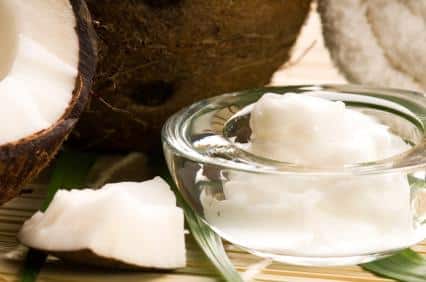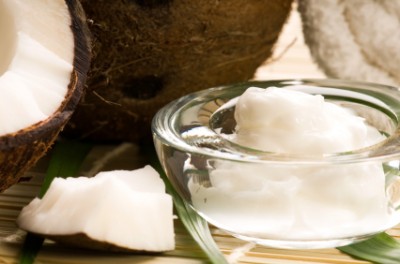Coconut oil has been dubbed the worst choice in oils for the last few decades. This hasn’t been true throughout history, however. Before World War II, it was one of the main oils used in America’s kitchens. After the war, coconut oil became hard to get, and the U.S. turned its focus toward the plants grown within the country and the production of products such as margarine, shortening, and refined oils from sources such as corn, oil, soy and canola.
Studies have shown that these highly refined oils are not as good for us as we once thought. The refining process, among other things, destroys much of the nutritive value of the oils. It has also been discovered that it is not saturated fat that causes health problems; it is the hydrogenation of the oils that in turn creates trans-fats, which are a contributor to heart disease and other health issues. When coconut oil attempted to make a return, much of what was available and used in the studies in the ‘90s was refined (movie popcorn, anyone?), and due to the saturated nature of the oil, coconut oil was given a bad rap.
More studies have been done since. We now know that coconut oil, in its raw, unrefined state, has great potential of being a healthy oil to have around the house. While 90 percent of raw coconut oil is saturated fat, around 50 percent of that fat is made up of lauric acid, among other beneficial components. Lauric acid is not found in many other foods that we have available to us on a regular basis. It is most notably found in mother’s milk, and it helps to build and protect an infant’s immune system. Lauric acid is a precursor that, when ingested, the body converts to monolaurin, which the body then uses to fight against viruses, bacteria, protozoa, fungus, and other nasties that the immune system has to deal with day to day.
The lauric acid in raw coconut oil has been shown to help regulate thyroid function. It helps to stimulate the body’s metabolism, making it an aid in losing and maintaining a healthy weight. It helps to improve heart health by encouraging the platelets in the blood to flow naturally rather than be “sticky” like what happens when one consumes too many trans-fats and hydrogenated fats. Lauric acid also aids in proper digestion, using its antimicrobial properties to fend off parasites, bacteria, fungi, etc. that can cause indigestion.
To Receive Full Benefit: Eat It Raw
Raw, uncooked coconut oil is the first and absolute best possible way to get the most bang for your buck. If you find it difficult to use raw, it is good to note that raw coconut oil, due to its highly saturated nature, can handle cooking at high temperatures. This makes it one of the best choices for frying; though you do lose some of the benefits, you don’t get as much of the bad elements from heating oils.
Coconut oil is a solid at room temperature, provided your room’s temperature isn’t above about 76 degrees. At around 76 degrees, it becomes a pourable liquid. Depending on how you plan to use your coconut oil and whether you have air conditioning, you may want to put it in the fridge or another spot cooler than your kitchen in the summer time.
The strength of the coconut flavor varies from brand to brand and crop to crop. If you think one brand has too strong of a coconut flavor, try another brand.
Kitchen Uses Of Coconut Oil
Here are some ways that I have used raw coconut oil in the kitchen:
- Smoothies– Add a tablespoon or two to the blender and blend away.
- Hot Drinks– Adding a spoonful of raw coconut oil to your coffee or hot chocolate lends a little tropical flair.
- Shortening/Butter Substitute– In its solid state, I measure coconut oil like I would shortening as a substitute for shortening or butter in cookie recipes. I have also used half raw coconut oil and half the oil that the recipe calls for.
- Frying – I have used it in making stir-fry and for frying eggs. The stir-fry was good, but I find that I prefer bacon grease or butter to fry eggs.
- Rice – Add a spoonful to the pot as rice is cooking to help prevent sticking.
- Popcorn – Gently melt and pour over air-popped popcorn, or use as the oil to pop corn on the stove (yum!).
- Recipes Calling For Coconut Oil– It is getting easier to find recipes that actually call for using coconut oil. Find one and dive in!
Uses Beyond The Kitchen
Raw coconut oil has uses that can benefit the body beyond simply eating it. I have found that raw coconut oil has the potential to replace many personal care products in the household. Who doesn’t like a multi-purpose product—a little less clutter, a little simplification as we figure out how to care for our families? The antibacterial, antifungal, and antiviral attributes of raw coconut oil make it great for many uses, including but not limited to the following.
Deodorant– I have found that a fingertip dab of coconut oil applied under each arm after I step out of the shower outperforms most, if not all, of the “natural deodorants” available on the market these days. I can’t say that it works as well as my fallback of Lady Mitchum Unscented (which ranks low on the skin deep site), especially on scorching hot and humid days of late summer, but it sure works better than many of the other natural products.
Lotion– Since it is an oil, it almost goes without saying that coconut oil is a good option for using as a body lotion. Be cautious using it on your face, as I have found it to be a little too oily for my skin. For people with dry skin, it might be just the thing for them.
Sunscreen – Coconut oil has been touted as an effective sunscreen. There are those that say that upping healthy fat intake helps to reduce incidence of sunburn as well. My family and I tend towards being very fair-skinned, so I haven’t completely tested this one. So, for me, the jury is still out on this one, but you can do some more research and test it for yourself to see if it works for you. You will probably need to apply it much more often than you would when using a commercial sunscreen, and your experience may vary from others, depending on how much skin pigmentation you have to work with.
Hair Care– My daughter has very curly hair that tends towards being dry and frizzy. Coconut oil works wonders on her hair. I simply dip my fingers in the coconut oil, work it through her dry hair with my fingertips, concentrating on the ends and working the tangles out. It soaks into her hair, leaving it hydrated and shiny, yet it does not leave it looking greasy.
Eczema Treatment– Coconut oil can be an effective treatment for eczema. I can say that, for my son, it was one of the more effective oils when all of the big-brand commercial products were not working. We have since focused on probiotics and healthy nutritional oils in the diet, and he no longer has the mysterious outbreaks he used to have. I have the inkling that whether raw coconut oil works for you or your loved one’s eczema will depend on the root cause of the eczema. From my experience with my kids’ eczema and reading others’ accounts, eczema can be a hard thing to figure out and successfully treat. I would encourage you to try raw coconut oil and see if it works!
Antifungal Uses
There are many health ailments that we encounter that we may or may not tie into being fungus-related, and raw coconut oil can be beneficial for many of the fungal problems you may face. The following applications are mostly topical, but I would like to suggest that if you are facing fungal issues, it probably couldn’t hurt to examine your diet as well and increase your raw coconut oil intake, among other things. In addition, for all of the suggestions below, it is prudent to have a separate container from your kitchen-use raw coconut oil.
Athlete’s Foot/Dry, Cracking Heels- It’s only been in the last year or so that I realized that when I was dealing with dry, cracking heels that itched a little bit, I was actually dealing with fungus. I was in denial that I could possibly have athlete’s foot, but I decided to try using coconut oil anyway.
My method of treating dry, cracking heels and feet:
1. Mix raw coconut oil with salt and stir it or knead it, depending on the state of your oil.
2. Situate yourself with a towel and your mix near the tub or shower, or if you are limber, the sink.
3. Massage the oil/salt mixture into your feet, focusing on the dry areas.
4. Let sit for a few minutes.
5. Rinse with warm water, followed by cold water. Pat dry with a towel.
The same method works for a hand scrub and an all-over body scrub. Be careful not to slip in the shower or tub! Thoroughly clean the shower or tub after use so the next unsuspecting person doesn’t have an impromptu slip ‘n slide session and get hurt.
Ringworm- Ringworm is a fungal skin infection. If you find you have this, apply raw coconut oil topically a couple times a day until it goes away.
Diaper Rash- Baby’s bum will sometimes get rashy, no matter what you do. Using coconut oil as a diaper cream can help to inhibit and kill any yeast/fungal infection (as well as bacteria) that is so often associated with diapering.
Thrush- Thrush, a fungal infection of the mouth, occurs in infants from time to time and can cause problems with nursing. It presents itself as a white furry coating on the tongue, and the nursing mother will often have itchy, sore nipples. Coconut oil, applied before and after nursing and between nursing sessions, may be one option to try. Use your own discretion, based on the age of your infant, your doctor’s recommendation, and other medical alternatives.
Feminine Itching- Raw coconut oil is also good to use for when girls feel itchy after being in a swimming suit for too long. Apply to the affected area. It usually only takes one or two applications. This works for women who are prone to yeast infections or general itchiness as well. Consult your doctor if the condition persists.
Sexual Lubricant
Yes, raw coconut oil has also been shown to be a highly effective sexual lubricant. It does not dry up like commercial lubricants, is not sticky, does not have the additives that give some more natural-minded women pause when considering application to their nether regions, and perhaps most importantly, it helps to prevent yeast infections that some women are prone to after periods of intimacy.
Coconut oil should not be used with latex products, such as latex condoms, as it may break the latex down and reduce effectiveness.
Antiviral Use
Raw coconut oil has been shown to kill viruses and bacteria. If I feel a sore throat coming on, I have been known to eat a spoonful of coconut oil. If I feel a cold sore coming on, I eat the coconut oil and I apply the coconut oil at the site until the tingle goes away. Next time you feel like you are coming down with something, try it and see if it helps you!
Raw coconut oil has many benefits and uses. It has great potential to stand in for many different products, making it a good addition to the kitchen cupboard, the medical kit, and in the personal care bag.
How do you use your raw coconut oil? Have you seen any benefits? Let us know!
©2012 Off the Grid News











